Kevin DeYoung's Blog, page 147
March 9, 2012
Worship Concessions and Unity
Guest Blogger: Jason Helopoulos

Worship. I hold to the regulative principle out of conviction. Some of you may not hold to the regulative principle, but you do have some conviction rergarding worship. I have yet to meet a Christian who doesn't. Whatever that conviction is, we would all do well to listen to Calvin's admonition to the church in Wezel.
Now, I want to remind you that this is John Calvin. He has never been accused of lacking in the area of opinions and convictions regarding worship. He was intentional in ordering the liturgy in both Strasbourg and Genevea. He trained pastors to risk their lives in establishing faithful worship in France. He had true convictions that were to him a matter of life and death. He would not budge on that which struck at the substance of the faith, but he was willing to accomadate himself out of mutual love for the church and his brethren when the substance was not in jeopardy.
This is a quote from a letter he wrote to an already existing congregation regarding the use of candles in worship. To be clear, Calvin is writing to an already established church with established practices. If it was a new church or a church in which a practice disagreeable to him had not yet been introduced, he makes it clear that he would labor against its introduction. But here, in an already established church, he doesn't want to see its unity jeopardized. It is worth some time of reflection, lest some of us have what Calvin calls an "excessive rigor and moroseness" over issues of form and cirucmstance when the elements and substance are present:
'We do not hold lighted candles in the celebration of the eucharist nor figured bread to be such indifferent things, that we would willingly consent to their introduction, or approve of them, though we object not to accommodate ourselves to the use of them, where they have been already established, when we have no authority to oppose them. If we were called upon to receive such ceremonies, we should hold ourselves bound according to the position in which God hath placed us, to admit of no compromise in resisting their introduction, and in maintaining constantly the purity which the church confided to us already possesses. But should our lot be cast in some place where a different form prevails, there is not one of us who from spite against a candle or a chasuble would consent to separate himself from the body of the church, and so deprive himself of the use of the sacrament. We must be on our guard not to scandalize those who are already subject to such infirmities, which we should certainly do by rejecting them from too frivolous motives. And when it would be for us matter of deep regret, if the French church which might be erected there should be broken up, because we would not accommodate ourselves to some ceremonies that do not affect the substance of the faith. For as we have said, it is perfectly lawful for the children of God to submit to many things of which they do not approve. Now the main point of consideration is, how far such liberty should extend. Upon this head let us lay it down as a settled point, that we ought to make mutual concessions in all ceremonies, that do not involve any prejudice to the confession of our faith, and for this end that the unity of the church be destroyed by our excessive rigor and moroseness.' (emphasis added)—Letters of John Calvin 3:30-31 (Letter to the Brethren of Wezel, March 13, 1554).
March 8, 2012
Worship Wars–Proposing a Few Ground Rules
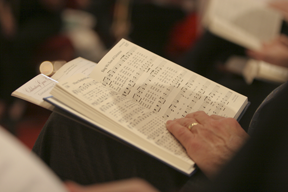 Guest Blogger: Jason Helopoulos
Guest Blogger: Jason Helopoulos
Music is a gift, but too often it doesn't feel that way as it becomes the"bone of contention" in our churches. Our churches are filled with opinions, convictions, and passions about what is good, right, and proper music for God's people to sing in worship. We all have opinions, convictions, and passions, but I wonder if we can establish at the very least these ground rules related to our congregational singing?
Our congregational singing should be marked by:
• Biblically Informed Words: Whatever we sing, it must be biblically informed. The song is Christian and meaningful in worship, because of the words sung. If the words are wrong and unbiblical then the song has no place in Christian worship.
• Theologically Accurate Words: Some songs can be Biblically informed and yet theologically inept. A Professor I enjoyed during my seminary days used to say, "Bible, Bible, Bible, everyone uses the Bible." He was telling us in his own dramatic way that most heretics in the history of the Christian faith have used Biblical language; what they lacked, was theological accuracy according to the whole counsel of God's Word.
• Theologically Profound Words: The songs we sing as a body before the throne of God should reflect the very nature of God, who He created us to be, and what He desires from us. We are to love the Lord with all of our heart, soul, mind, and strength (Matt. 22:37). We are to worship Him in Spirit and in truth (John 4:23). The songs that we sing before Him should be filled with the glories of His truth and thus have an air of reverence about them. There are times and places for overly simplified songs, but when we are teaching and admonishing one another (Col. 3:16) and offering corporate worship to God through the Son, it should have some tenor of profundity.
• A Simple Tune: Some tunes are just too complex for corporate singing. They may be beautiful, but what good is it if everyone stops singing because they can't sing it? Most of us have been in a service where a song begins and everyone tries to sing along, but after awhile the only people left singing are the select few who put the service together. This is corporate worship and sometimes the "corporateness" of it is destroyed by making it too complex.
• But Not a Simplistic Tune: But let's be careful with the above suggestion. We also don't want simplistic tunes. It should be complex enough that it speaks to the weighty nature of our God and the worship we are enjoying. A tune like "Row Row Row Your Boat" if used in worship (Though it seems absurd, I have heard similar tunes of simplicity in worship) would actually undermine that worship.
• A Consistent Tune: A lament should sound like a lament. A song of thanksgiving should sound like thanksgiving. Some hymns and songs have the wrong tempo with the message they are asserting.
• The People's Voice Being Heard: Congregational singing is congregational singing. That may seem axiomatic, but for many well-intentioned churches this is not the case. When God's people sing "psalms, hymns, and spiritual songs," we should be able to hear God's people sing "psalms, hymns, and spiritual songs." The loudness of the instruments or the individuals/individual leading the congregation can actually drown out the voices of the congregation. I love musical instruments and I love hearing a good voice, I just shouldn't hear them in place of the voice that matters in congregational singing: that of the congregation! In addition, when instruments, musicians, and audio equipment are too loud they tend to create silence within the very quarter they are seeking to promote it in. A congregation that can't hear those next to them singing, let alone their own voice, will become mute.
We may not agree on whether we should sing traditional hymns, psalms, contemporary hymns, praise songs, etc. We may disagree about whether congregational worship music should be accompanied by an organ, a piano, guitar, or praise band. But whether we love hymns or songs, traditional or contemporary, it seems like these above points are a starting place in determining what music should be at the center of our congregational singing.
*Tomorrow's post will provide some helpful advice from John Calvin about our convictions regarding worship.
March 7, 2012
Children in Worship–Mom Tested Tips
 Guest Blogger: Jason Helopoulos
Guest Blogger: Jason Helopoulos
This is a follow-up on yesterday's post…
Focus on this moment throughout the week: Talk about Sunday morning worship all week long. Help your children to see that each week begins with this privilege (Acts 20:7; Hebrews 10:24-25).
Model excitement about the Lord's Day: Children learn a great deal by watching their parents. If Mom and Dad reluctantly go to church, then the children will reluctantly go to church. If Mom and Dad are critical of the preacher, sermon, etc. then the children will most likely be critical. Wake up early on Sunday morning and prepare for worship. Let the children see your joy and excitement.
Implement family worship at home: A family that worships together at home will find it much easier to worship together in corporate worship. A child will find it natural to hear the Word of God, to read the Word of God, to sing the hymns, etc. This will also help our children to learn to sit still, to understand the importance of worship, to focus during prayer, etc.
Read the passage during the week: Most sermon series are an exposition of one book of the Bible. This means that you know what you are going to hear read and preached in the week's service—the next passage. Read it throughout the week and converse about it around the dinner table or during family worship. The children will then be familiar with the text that the pastor is preaching on. With this knowledge, give them some things to listen for in the sermon.
Start early: Many believe that it is harder to introduce a five year old to corporate worship then a twelve year old, but this is not true. A five year old is in the formative years of training. They are not yet "set in their ways." A few months of struggling with a four or five year old teaching them how to sit in corporate worship yields benefits for the rest of their lives.
Use Moments in the Service: Use transitional moments in the service to whisper in your child's ear how much you loved a certain verse in a hymn, how you need to remember to pray for the sick person mentioned, or how you were convicted by that application. It keeps them engaged and allows them to see you participating intently in the service.
Use the Obvious Helps: We often forget to use the helps that are already available to us. For example: have an older child find the Bible passage or guide your finger over the text as it is read for a younger child. Use the bulletin and show your children where the service is at. Have them read the confession as you point along with each word.
Sit near the Front: Children are easily distracted, so sit near the front where there are less distractions.
Create an atmosphere in your row: Encourage your children to pay attention, to stand when everyone stands, to sing when they are to sing, to bow their heads in prayer when the congregation is to pray, etc.
Enlist the Support of Other Members: Ask another member to lend a helping hand by sitting with your family. Surround yourself with other families that you have enlisted to provide you encouragement and not to fuss if your child is a little restless.
Stop Worrying: Many parents are concerned about what other parents or members of the congregation think of their parenting skills or how annoyed someone else is with their child's fidgeting during the service. DON'T! Commit as a congregation to welcome children into your services. This means that not only do our children have to adjust, but so do the adults. In reality, it is adults who have to adjust the most! Let's just learn to have a little more tolerance on this front. If a baby is a little fussy, papers are rustling, or a few things are dropping on the floor it is o.k. As congregations, we need to willingly and joyfully join in this great privilege of welcoming our covenant children into corporate worship. And that takes some minor adjusting on our part.
Affirm Your Children: When you leave the service and are on the way home, affirm your children. Ask them questions about the service and relay how the Lord blessed you. Encourage your children if they were well-behaved and let them know how wonderful it was to worship alongside of them.
Be Consistent: It will take time for your children to learn how to sit still, sing the hymns, etc. Be consistent in your expectations and desires for them during the service.
Do Not be Overzealous: Be patient with your children and shower them with grace. It takes children time to adjust and different children adjust or accept on different time tables. Your child may come into the service and sit attentively and quietly within a few weeks or you may have to help your child with this for months or even years (as has been our case!). Be patient! Love them and do not compare them to other children. God has blessed you with this little bundle of joy!
March 6, 2012
Children in Worship–Let's Bring it Back
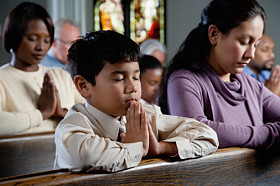 Guest Blogger: Jason Helopoulos
Guest Blogger: Jason Helopoulos
I remember sitting as a small child in church sucking on wintergreen mints and drawing battle scenes on the offering envelopes (my mother would always give me a tap of correction when the explosions were a little too loud with my scribbling pencil). And though I might have been preoccupied with my wintergreen mints and airplanes dropping bombs on tanks, I was picking things up. Was it easy for my single mother to corral a feisty little boy and his sister in the pew? No, it is a testimony to her patience and grace! But it was good for my soul.
As the church, let's be open to the idea of inviting our children into worship again. Let's be patient, deliberate, and wise, but let's encourage families to have their children in worship as soon as they are able. Not all families or children will be ready to do this as each family functions under different circumstances. So having said this, let's not go overboard. I think every church should have a well-equipped nursery at least for children under the age of five years old and even beyond if they deem it appropriate. In addition, we must be sensitive to visiting families and those that just aren't convinced that children belong in corporate worship. So we must be patient and understanding, but it is something we should be aimed at before our children are driving cars! Even if our children cannot understand all that is happening, struggle to sit still, and even are bored at times during the service they are still benefiting from being in the midst of this divine meeting between God and His people (Mark 10:13-16). And at the very least they will come to appreciate the power of wintergreen mints.
Today, I want to offer a few reasons on why we should encourage the children of the church to attend our corporate worship services. Tomorrow, I will pass along some helpful hints for parenting in the pew.
Why should children attend the worship service?
Our children are members of the covenant community (the church): Corporate Worship on Sunday morning is the primary activity the covenant community engages in together (Acts 2:42; Ephesians 10:24-25). Therefore, our children as members of this community should be included in this crucial aspect of covenantal life.
Our children will be present in the midst of the means of grace: Our children benefit by being where the Word is preached (Romans 10:14), the sacraments are administered (Matthew 28:19-20), and corporate prayer is practiced (Acts 2:42-47). These are the chief means by which God pours out grace upon His people. Why knowingly rob our children of this blessing?!
Our children will be present in the midst of the entire congregation: Our children benefit greatly by being in the presence of Christians of various ages. They are able to see that the faith of their parents is not a faith that they own alone, but is a faith that is important to all of these people who are gathered around them on Sunday morning. This only reinforces what Mom and Dad are modeling and teaching when they see this incredible gathering of people reading the Word together, praying together, confessing together, and singing together (Deuteronomy 31:9-13). They need to see the body in action.
Our children will be present with their parents: Worshipping together as a family helps to counter the current trend in our society of fragmenting our families. If our children join us in worship from four years of age until they are eighteen they will worship with their parents in 780 Sunday morning worship services! Think about the cumulative effect of a family worshipping together, in the midst of the means of grace, meeting with God for 780 Sundays in a row.
Our children will witness their parents worshipping: It is the Biblical role of parents to disciple their children in the faith (Deut. 6; Psalm 78; Eph. 6). What a benefit there is when children witnesses their mother or father singing with conviction, praying in reverence, listening intently to the sermon, or receiving the Lord's Supper in joy. In these moments a child witnesses the importance of faith and worship. There are few greater encouragements to a child's faith then seeing their parents worship God with reverence and joy. (Exodus 12:1-28; Deut. 4:9-11; Deut. 6; Psalm 78; Ezra 10:1; Nehemiah 12:43; Joel 2:12-17; Acts 16:33).
Our children will learn the rhythms of church life: Teenagers in our culture often balk at attending corporate worship. But how many of our teenagers have we setup for this reaction, because we did not consistently include them in worship until they were a teenager? If attending church for years has always meant coloring Bible pictures, singing songs to a cd, playing games, and doing crafts—then we should not be surprised that our young people find worship to be odd, uncomfortable, and even boring. I love good children's songs—they ring through my house. I love good children's Christian crafts—they decorate my study. But if this alone is the rhythm of church life we have set up for our children week in and week out, we have done them a great disservice. They must see, know, and learn that the singing of the great hymns of the faith, the preaching of the Word, reading of confessions, corporate prayers, etc. is anything but boring. It is the gathered life of the community of faith. It is our weekly rhythm—appointed by God, designed by Him, established for the ages—this is what we want them to know, because we want them to know and worship Him.
March 5, 2012
Monday Morning Humor–A Real Page Turner
March 3, 2012
Thoughtful Orchestration
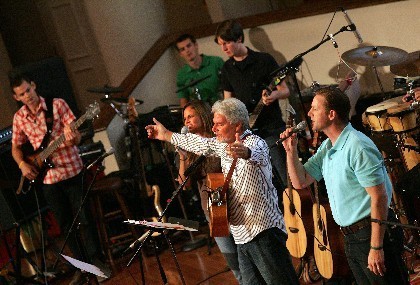 Speaking of wise words from Harold Best, here are some good thoughts on thinking carefully about how to use (and, just as critically, not to use) instruments in corporate worship:
Speaking of wise words from Harold Best, here are some good thoughts on thinking carefully about how to use (and, just as critically, not to use) instruments in corporate worship:
I want to be respectful and thoughtful in these next words, and I realize that I might be wandering into the territories and preferences of other contributors to this book. But as valuable as the instruments and sounds of the typical praise band might be, they often do little to bolster and enhance congregational song in the pure sense of physics and acoustics. They can easily overwhelm to the point where congregations no longer hear themselves sing and end up accompanying the worship band, when the reverse should be true. This does not mean praying for good riddance. That would be evil. Rather, it means that musicians who truly understand the laws of sound, the acoustical congregational voice, and the rigors of instrumental collaboration must make use of their instruments in radically different ways. I attend a church in which the worship band—especially the drummer—understands how delicate and understated their work can be. As a result, there is better singing and less watching than I have observed in so many other churches and colleges around the country. By the same token, organists must be more insightfully trained as to how the instrument is to be played beyond the often boringly slow and tedious sound masses that are enough to put a thunderstorm to sleep.
I long for the time when all instruments together comprise a worship band, where insightful musicians will come to understand the orchestrational aspect of instrumental music. I mean this: A skillful orchestrater understands that all the instruments at his or her disposal do not play all the time—no, not even the drum set. Rather, through sensitivity to the rich variety of musical contexts and, in our case, to the wide-ranging contexts of congregational song, instruments and instrumental combinations are chosen that remain in perpetual ebb and flow, showing sensitive shifts of color and texture based both on the art of musical cation and the nuances of text and context. This is not impossible; it is simply difficult. But what isn't when it comes to doing things well? (Exploring the Worship Spectrum: 6 Views, 74)
March 2, 2012
Don't Ditch the Organ
 Harold Best was for many years the dean of the Conservatory of Music at Wheaton College. Every pastor and worship leader, of all musical persuasions and contextual hues, would do well to read these two paragraphs from him about the organ.
Harold Best was for many years the dean of the Conservatory of Music at Wheaton College. Every pastor and worship leader, of all musical persuasions and contextual hues, would do well to read these two paragraphs from him about the organ.
This is as good a place as any to bring up the subject of keyboard instruments, especially organs. I would contend that organ playing is indispensable to hearty congregational song, despite the thoughtlessness with which the validity of this instrument is questioned as part of outmoded traditions and listening habits. Before going further, I want to be the first to acknowledge that the organ has been misused by being overused by zealous, solo-minded performers. I would also acknowledge that the organ world has often sired a kind of snobbery that has impeded the concept of church music as humble service. Finally, I acknowledge that for many, the organ has turned out to be a mystically overpowering idol. More than the legendary king of instruments, it has often been seen as the king of kings, with may organists choosing their church jobs on the basis of the quality of the organ rather than on the call of God to quiet, meek service.
Even so, the baby should not thrown out with the bathwater. Let me say why. The very basis of the design of even the most modest organs flows directly out of natural, God-given laws found in the overtone series. I want to avoid the massive technicalities of physics and acoustics, so let me say it this way: Without any doubt, the organ is the most naturally supportive instrument for singing that Western culture knows of. Its very design and its intelligent use in hymn singing are meant to accomplish one purpose: to support singing by the intelligent use of registers chosen to fill in the cracks–to provide both an underpinning and a blossom to the work of the congregational voices. The result is s synergy: the whole greater than the sum of the parts. People are moved to heartier song without being overpowered or displaced, and their natural untrained voices are significantly validated and enhanced. True, there are those times when the organ soars above and beyond its normal collaborative task in the provision of free accompaniments and occasional iterations of brilliance and dash. But in the hands of a good organist, these should be reserved for those momentary or seasonal and festive times when clear hymnic water is turned into the polyphonies of rich wine. An organ does not have to be gargantuan to accomplish these tasks—not when it is well designed and properly played. (Exploring the Worship Spectrum: 6 Views, 73)
March 1, 2012
Nothing Is Hidden From His Sight
 If the presidential campaign teaches us anything it is that everything you say and do can and will be held against you. Everyone likes the word experience, but experience comes with a record, and every record comes with imperfections. In the age of easy information and infinite examination every vote, every speech, every article, every informal comment, every off the cuff remark can live forever on the internet and be the subject of endless scrutiny.
If the presidential campaign teaches us anything it is that everything you say and do can and will be held against you. Everyone likes the word experience, but experience comes with a record, and every record comes with imperfections. In the age of easy information and infinite examination every vote, every speech, every article, every informal comment, every off the cuff remark can live forever on the internet and be the subject of endless scrutiny.
I know there is little sympathy for politicians but you do have to feel just a little sorry for them. There are plenty of You Tube videos of President Bush saying all manner of jumbled, hilarious things. And now there are videos of President Obama with a litany of stutters and "uh's" and awkward comments. Hopefully presidents have thick skin and the ability to laugh at themselves. You have to if all your public communication is to be recorded and archived year after year. Imagine how many dumb remarks you'd have to live down if someone kept track of your speech for five months or five years or five decades.
Which brings me to my point. There is no one on the planet who would look better if every word, thought, and deed were known for all the world to see. Sure, some folks would have a lot of hidden good deeds to be proud of. But taken as a whole, we could all be taken down by a 24/7 camera and an internet connection. Anyone with bad motives (or good I suppose) and enough intimate access could paint a thoroughly unflattering picture of our lives. To know absolutely everything about a person's entire history is to see that every person is conflicted, flawed, and sinful. If nothing else, the presidential process ought to remind us that we are fallen people electing fallen leaders.
Moreover, the process should serve as a warning to us all: there is Someone who knows and sees all that we do and all that we are. No creature is hidden from God's sight, but all are naked and exposed to the eyes of him to whom we must give account (Heb. 4:13). Or as Proverbs says, "The eyes of the Lord are in every place, keeping watch on the evil and the good" (Prov. 15:3). Most people say they can't imagine running for President because who wants that kind of scrutiny for you and your family? And yet, we will all face the most perfect, most exacting, most knowledgeable scrutiny of all time when we stand before the judgment seat of God (Heb. 9:27). We will have to account for every careless word we speak (Matt. 12:36). Everything will be laid bare. We will be laid bare.
The next time you roll your eyes at the negative ads and the relentless oppo research or another unflattering revelation dominating the day's news, take it as the Lord's kind reminder to repent. For the campaign trail may not have a lot of grace, but God does. Call on him in faith and he'll bury the accusations against you for the sake of his unburied Son. He'll give you something better than a president on your side; he'll give you a King to stand in your place on the last day.
February 29, 2012
Prayers, Travels, and Blogs (Oh My!)
 I will be out of the country from March 5-21 traveling in the Middle East, first to speak at a conference in Dubai and then to visit several friends from our church in the region.
I will be out of the country from March 5-21 traveling in the Middle East, first to speak at a conference in Dubai and then to visit several friends from our church in the region.
I'm glad that one of our former pastoral interns, Nick Setterington, will be coming with me. Nick is a seminary student at Puritan Reformed, a leader in our international ministry, part of our missions committee, and an all around great guy.
While I'm gone Jason Helopoulos will be helping out with my blog, filling in March 5-11 and 19-24. I have a series planned for the week of March 12. I may also blog here and there while I'm gone, but don't count on much.
Please pray for Nick and me as we travel, speak, meet, greet, learn, listen, and eat new foods. Pray for our families also. And pray that we can be an encouragement to all those we visit over the next few weeks.
Book Briefs
 Gerald Hiestand and Jay Thomas, Sex, Dating, and Relationships (Crossway 2012). This is a straightforward, yet provocative little book. You'll find a lot of practical, sane, biblical wisdom that will explode a number of our cultural assumptions about dating. If you are single or care about someone who is, you really should read this book. The result may just be a simpler, more God-honoring approach to dating than you thought possible.
Gerald Hiestand and Jay Thomas, Sex, Dating, and Relationships (Crossway 2012). This is a straightforward, yet provocative little book. You'll find a lot of practical, sane, biblical wisdom that will explode a number of our cultural assumptions about dating. If you are single or care about someone who is, you really should read this book. The result may just be a simpler, more God-honoring approach to dating than you thought possible.
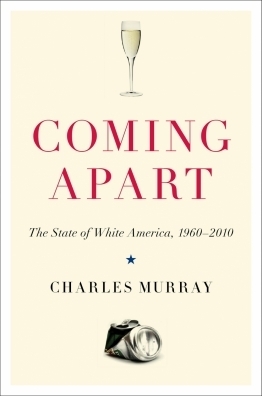 Charles Murray, Coming Apart: The Story of White America, 1960-2010 (Crown Forum 2012). A much talked about new book that is well worth your time. The gist: "This book is about an evolution in American society that has taken place since November 21, 1963, leading to the formation of classes that are different in kind and in their degree of separation from anything that the nation has ever known. I will argue that the divergence into these separate classes, if it continues, will end what has made America America" (11). And don't let the title fool you, the story Murray tells is relevant for all Americans. Whether you agree every jot of his analysis and every tittle of his prescription, you will be challenged to think more deeply about virtue, vice, segregation, culture, the elite, the working class, happiness, and the uniqueness of the American project.
Charles Murray, Coming Apart: The Story of White America, 1960-2010 (Crown Forum 2012). A much talked about new book that is well worth your time. The gist: "This book is about an evolution in American society that has taken place since November 21, 1963, leading to the formation of classes that are different in kind and in their degree of separation from anything that the nation has ever known. I will argue that the divergence into these separate classes, if it continues, will end what has made America America" (11). And don't let the title fool you, the story Murray tells is relevant for all Americans. Whether you agree every jot of his analysis and every tittle of his prescription, you will be challenged to think more deeply about virtue, vice, segregation, culture, the elite, the working class, happiness, and the uniqueness of the American project.
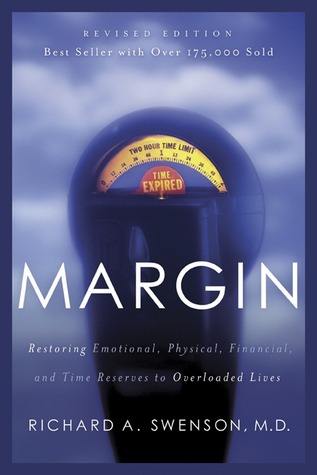 Richard A. Swenson, Margin: Restoring Emotional, Physical, Financial, and Time Reserves to Overloaded Lives (NavPress 2004). A great book for busy, stressed out people (if only you could find the time to read it!). Swenson is a medical doctor and a Christian. He writes well, avoids extremes, and offers lots of practical advice. This book is not going to plumb the doctrinal depths (and there are a few theological missteps here and there), but overall the book is very wise and very necessary.
Richard A. Swenson, Margin: Restoring Emotional, Physical, Financial, and Time Reserves to Overloaded Lives (NavPress 2004). A great book for busy, stressed out people (if only you could find the time to read it!). Swenson is a medical doctor and a Christian. He writes well, avoids extremes, and offers lots of practical advice. This book is not going to plumb the doctrinal depths (and there are a few theological missteps here and there), but overall the book is very wise and very necessary.
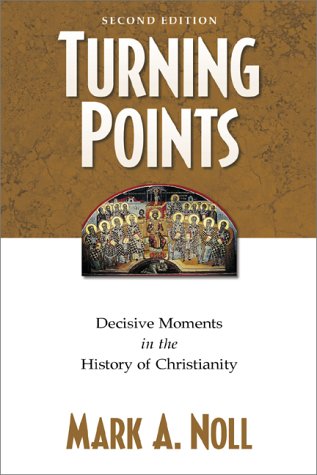 Mark A. Noll, Turning Points: Decisive Moments in the History of Christianity (Baker 1997). I just read this again as our staff worked through the book over several months. Noll has a terrific grasp of history and keep the narrative going with clear writing and interesting anecdotes. I like this book because of the structure, dividing church history into various turning points. On the down side: Noll's judgments are too nuanced at times and he can be quicker to criticize Protestants than Catholics, though he mentions several times he belongs to the former not the latter.
Mark A. Noll, Turning Points: Decisive Moments in the History of Christianity (Baker 1997). I just read this again as our staff worked through the book over several months. Noll has a terrific grasp of history and keep the narrative going with clear writing and interesting anecdotes. I like this book because of the structure, dividing church history into various turning points. On the down side: Noll's judgments are too nuanced at times and he can be quicker to criticize Protestants than Catholics, though he mentions several times he belongs to the former not the latter.
 James Bannerman, Church of Christ, Two Volumes (Volume One, Volume Two) (Solid Ground Christian Books 1868). With 900 pages on the doctrine of the church I'm sure Bannerman has thought of a lot things which never crossed your mind. The organization in these volumes is clear and logical, making a big work like this more accessible. Every Presbyterian or Reformed pastor–with easy, affordable access to these volumes–should purchase these for his library. They will be an invaluable resource.
James Bannerman, Church of Christ, Two Volumes (Volume One, Volume Two) (Solid Ground Christian Books 1868). With 900 pages on the doctrine of the church I'm sure Bannerman has thought of a lot things which never crossed your mind. The organization in these volumes is clear and logical, making a big work like this more accessible. Every Presbyterian or Reformed pastor–with easy, affordable access to these volumes–should purchase these for his library. They will be an invaluable resource.



